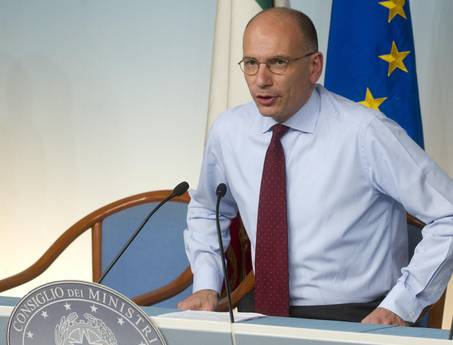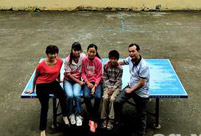 |
| (Photo/ ANSA.IT) |
Rome, October 15 - Italy's left-right government on Tuesday evening agreed a 2014 budget bill aimed at addressing the country's economic woes while sticking to EU-mandated targets and keeping market speculation at bay.
Premier Enrico Letta said the thrust of the three-year budget was to stoke growth by cutting taxes while averting spending cuts including a widely flagged reduction in the national health system's kitty.
"Enough of the axe-wielding, now we are focusing on growth instead," Letta said. "For the first time in a long time we have managed to keep accounts straight without hiking taxes," the premier said, stressing that it was the first budget in many years "that doesn't start with cuts requested by Brussels", after Italy recently emerged from excessive-deficit proceedings. "There will be a significant reduction in taxes for households, workers and firms," he said, saying that the tax burden on businesses would fall by 5.6 billion euros over the three years, and companies would get subsidies if they hired people on full-time contracts.
Italy's overall tax burden would fall from 44% to 43.3% in the three years, Letta said.
At the same time, there would be a 1.6-billion-euro fund to help small and medium-sized firms, as well as more cash for social policies and to help the growing numbers of people falling into poverty.
Another measure that will help get economic activity moving again are subisidies amounting to one billion euros for home improvements and other "green" moves, Letta said.
One billion euros would also be transferred to municipalities to help keep up services.
There would also be a return to setting industrial policy instead of leaving many firms to fend for themselves, with a "control room" at the economy minister, Letta said.
The budget would amount to 11.5 billion euros in 2014, 7.5 billion in 2015 and another 7.5 billion in 2016, he said. Health cuts, which had been vehemently opposed by Health Minister Beatrice Lorenzin after reports of a reduction of up to four billion euros, no longer featured in the package, Letta stressed.
Another move is the incorporation of a widely hated and recently scrapped property tax called IMU and local rubbish and service levies into a new, lighter tax, to be paid by homeowners and renters, called TRISE.
Economy Minister Fabrizio Saccomanni, the main architect of the budget, said the Italian economy had "significant potential for growth in the coming years". The budget came in response to calls from unions and employers.
Employers' association Confindustria urged the government to "send a strong signal" that it was turning away from EU-dictated austerity-focused policies and towards "substantive" moves to lift Italy out of recession and create jobs.
Trade unions also said the government had to address record unemployment including one in four young people out of work.
Earlier in the day, Letta said Italy's duty presidency of the European Union in the second half of 2014 will be focused on promoting economic growth.
Letta has been lobbying for the EU to put greater emphasis on stoking growth and fighting unemployment since he was sworn in at the helm of a left-right grand-coalition government in April.
Under the emergency technocrat administration of Letta's predecessor, Mario Monti, Rome adopted EU-mandated austerity policies that helped move Italy out of the centre of the eurozone debt crisis, but deepened the country's longest recession in over two decades.
The main advocate of those austerity policies is German Chancellor Angela Merkel, who was recently re-elected for a third term. "The last parliamentary term of the European Parliament was very hard," Letta said referring the EP session running from 2009 to 2014. "Next year we will have the duty presidency of the EU and will work so that the next legislative term will be one of growth after five years of austerity," added the premier, referring to the five-year EP term that will follow European elections in May next year.
Also earlier, European Economic Affairs Commissioner Olli Rehn said Italy had some margin for public investment to promote growth and still keep its public spending deficit at or below 3% of the gross domestic product (GDP).
The Italian government has been struggling to keep its deficit at 3% of GDP in order to meet a key European Union target.
"Italy still has a little bit of maneuvering room within the 3% deficit. It's small, but it's there," Rehn said at the end of the European summit of central bank chiefs and finance ministers ECOFIN, held in Luxembourg.
Rehn also added that "the latest (austerity measures) go in the right direction". Rehn's comments contrast his stark warnings to Italy in recent weeks, in which he said Europe was keeping a sharp eye on the effects of deep cuts made to the loathed IMU property tax, which then threatened to push Italy's deficit over the 3% limit.
Rehn was blasted by Italian centre-right lawmakers who had campaigned vigorously for the property tax cut.
However, the resulting imbalance in public finances triggered a one-percent rise in Italy's value added tax (VAT) this month as well as a government crisis in which the centre right threatened to scupper the governing right-left majority, but backed down at the last minute in a mutiny that surprised and embarrassed leader Silvio Berlusconi.
Rehn's relative optimism on Tuesday also differs from findings of the International Monetary Fund and Moody's rating agency, both of which predicted earlier this month that Italy would exceed the 3% deficit limit this year.
 2013 Colour Me Rad 5K run held in Canada
2013 Colour Me Rad 5K run held in Canada China's destroyer Qingdao sails out of Sydney Harbor
China's destroyer Qingdao sails out of Sydney Harbor Chinese tycoon aims to restore London's Crystal Palace
Chinese tycoon aims to restore London's Crystal Palace Admirers to bid joyful goodbye to Rubber Duck
Admirers to bid joyful goodbye to Rubber Duck Photo story: For the last three students
Photo story: For the last three students  Photo story: A day in the life of a car model
Photo story: A day in the life of a car model Chinese screen goddesses from Beijing Film Academy
Chinese screen goddesses from Beijing Film Academy  Weekly Sports Photos
Weekly Sports Photos World's most amazing yacht on display in Guangzhou
World's most amazing yacht on display in Guangzhou Photo collection of Chinese Navy
Photo collection of Chinese Navy Cold air sweeps through N China
Cold air sweeps through N China The last family in shantytowns
The last family in shantytowns UNESCO world heritage site: Montale Tower
UNESCO world heritage site: Montale Tower Israeli drone crashes into Mediterranean, fragments recovered
Israeli drone crashes into Mediterranean, fragments recovered Fiber-optic wedding dress show shinning in Suzhou
Fiber-optic wedding dress show shinning in Suzhou Day|Week|Month